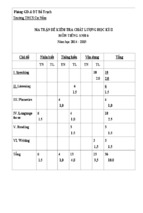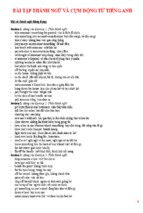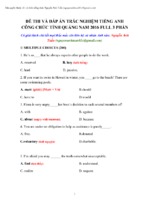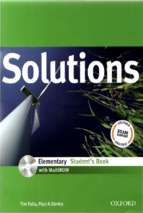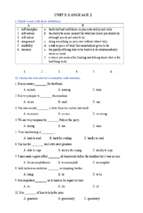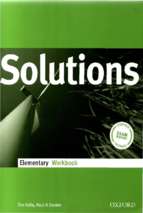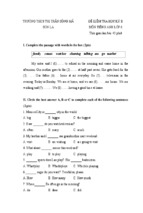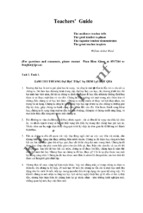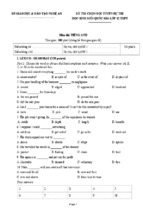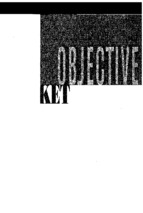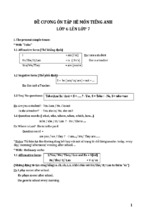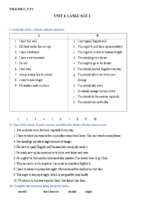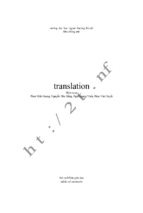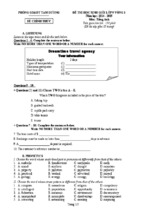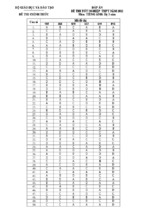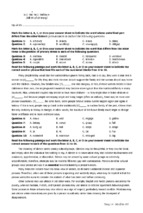Contents
Introduction vii
1 Preparing to Write 1
Verb Tenses 2
Auxiliaries 16
The Passive Voice 26
The Subjunctive Mode 31
Conjunctions 38
Pronouns 44
Possessives and Plurals 62
The Comparative and Superlative 68
2 Beginning to Write 75
Sentence Completion 75
3 Writing Original Sentences 87
Understanding the Format 87
Writing According to the Format 88
4 Story Completion 115
Understanding the Format 115
Completing Stories with Original Phrases 115
5 Writing Letters 151
The Friendly Letter 151
The Business Letter 157
6 Writing Original Themes 167
Appendix A: Irregular Verbs in the Past Tense
and Past Participle 173
Appendix B: Verbs and Tenses 177
Answer Key 187
Thuvientailieu.net.vn
Introduction
Writing in any language is a difficult skill to acquire. Therefore, as an ESL student you should approach writing in English carefully. In order to write well,
you want to first have an understanding of grammatical structures, vocabulary,
and tense usage. You practice those concepts until you can use them with relative ease. Then you are ready to practice writing original material.
This book does two things:
1. It gives you an abundant review of basic structures.
2. It provides various forms of writing practice within a controlled
program that focuses on improving the skills needed to write
accurately.
In Chapter 1 you will have the opportunity to learn or review grammar
basics. By checking the Answer Key at the end of this book, you can find the
correct or example answers to the exercises. If you have an English-speaking
friend, you might ask him or her to check your work.
If you wish, you can follow your progress by using a very simple method.
After each exercise, count every word that you have written—even little words
like the, a, and, or but. Then count every error you have made in spelling, tense,
word order, missing words, or any other potential mistake.
Divide the number of words you have written (W) by the number of errors
(E) you have made. The result is a number (N) that you can compare after every
exercise you write:
W⫼E⫽N
If you wrote sixty words and made twelve errors, you would come up with:
60 ⫼ 12 ⫽ 5
If the number is getting larger, you are making progress.
vii
Thuvientailieu.net.vn
viii
Introduction
After completing the review exercises, you will be ready to begin Chapter 2.
In this chapter you will complete sentences with your original phrases, and you
will use your own ideas as you write. You will see a sentence similar to this:
John borrowed
to get to work.
You might write something like this:
John borrowed
his father’s new car
to get to work.
For each exercise in Chapter 3 you will compose ten short, original sentences while using a phrase as the specific element in each sentence. For
example:
Sample phrase: The new car
Used as the subject: The new car is in the garage.
Used as the direct object: Mary loved the new car.
Used after the preposition to: A man came up to the new car.
You may, of course, use dictionaries and grammar books as aids in order to
write as correctly as possible. You could give yourself a time limit (fifteen minutes or thirty minutes) for writing the exercise, but use the same number of
minutes each time you write.
In Chapter 4 you will fill in the missing phrases or sentences in a story. They
can be any phrases or sentences that you wish, but they must conform to the
plot of the story. For example:
The Diamond Ring
The robber crept into the hallway of the dark house and turned on the
light. On the desk he saw a beautiful silver box holding a diamond ring,
which he put in his pocket. Then he opened the window, jumped to the
ground, and fled down the street.
Chapter 5 deals with letter writing. Each letter can be written within the
same framework of time (fifteen minutes, thirty minutes, or longer). There is
a difference between “friendly” letters and “business” letters. This part of the
writing program will help you to write both types of letters.
Thuvientailieu.net.vn
Introduction
In Chapter 6 you will write original stories. The stories are to be based on
the assigned topic, and they should include the grammar structures indicated.
For example:
Sample title: Lost in the Desert
Include these structures:
the relative pronoun which
to want to in the past perfect tense
the conjunction if
You would then write a story about someone lost and roaming the desert.
You would probably write of heat and thirst and of the difficulties of finding a
way to safety. And somewhere in your story you would have three sentences
similar to these (which include the required sample structures):
She believed she saw a lake, which, unfortunately, was only a mirage.
She had often wanted to climb a sand dune.
If she found water, she knew she would survive.
If you feel you have not done well enough in any chapter of this book, do
not go on to the next chapter. Instead, repeat the chapter that needs improvement. Set a standard of quality for yourself and conform to it. Use the Answer
Key not only to check your work but also to find suggestions for how to write
appropriate sentences for any of the exercises.
Thuvientailieu.net.vn
ix
This page intentionally left blank
Thuvientailieu.net.vn
1
Preparing to Write
In order to write well in English, you should understand the basics of the language. Probably the most difficult area for students learning English is verbs.
Although English verbs are used in complicated ways, they do not have complicated conjugations with a different ending for each pronoun like other languages might.
GERMAN
SPANISH
RUSSIAN
ich fahre
yo hablo
du fährst
tu hablas
er fährt
el habla
wir fahren
nosotros hablamos
ihr fährt
vosotros habláis
sie fahren
ellos hablan
With most English verbs there is only one ending (-s or -es) in the third person singular of the present tense. The only exception to that rule is the verb
to be:
TO SPEAK
TO BE
I speak
I am
you speak
you are
he speaks
he is
we speak
we are
you speak
you are
they speak
they are
But English has other complexities. For example, there are three ways to
express the present tense:
• The simple conjugation of the verb means that the action of the verb is a
habit or is repeated. For example: “We speak.”
1
Thuvientailieu.net.vn
2
Writing Better English
• When the verb is conjugated with a form of to be (am, is, are, was, were),
the verb will have an -ing ending. It means that the action is continuing
or not yet completed. For example: “We are speaking.”
• The third present tense form uses a conjugation of to do (do, does) with
the verb and has three uses: (1) It is used to ask a question with most
verbs except to be or certain auxiliaries (can, must, should, and so on).
(2) It is used as an emphatic response. (3) It is used to negate the verb
with not. Let’s look at some examples with the verb to speak:
I speak English. (This is my habit. I speak English all the time.)
I am speaking English. (I usually speak Spanish. At the moment I am speaking
English.)
Do you speak English? (A question with the verb to speak.)
I do speak English. (This is your emphatic response to someone who has just
said, “You don’t speak English.”)
I do not speak English. (Negation of the verb to speak with not.)
Conjugating English verbs is not difficult. But choosing the correct tense
form from the three just described requires practice. The exercises that follow
will help you to use English verb forms and tenses with accuracy.
Verb Tenses
Study the following examples, which show how verbs change in the various
tenses. Some tenses require a form of to be and a present participle. Present participles have an -ing ending: is going, were singing. Other tenses require a past
participle. Regular verbs form the past tense and past participle in the same
way—just add -ed: worked, have worked. Use Appendix A of irregular verbs in
the past tense and past participle to see how they are formed.
The perfect tenses of both regular and irregular verbs are a combination of
a form of to have plus a past participle: I have worked. She has seen. You had broken. Tom will have discovered.
In the exercises that follow you will be making similar tense changes.
TO SPEAK—a habit or repeated action
Present
She speaks well.
Past
She spoke well.
Thuvientailieu.net.vn
Preparing to Write
Present Perfect
She has spoken well.
Past Perfect
She had spoken well.
Future
She will speak well.
Future Perfect
She will have spoken well.
TO BE SPEAKING—a continuous action
Present
Who is speaking?
Past
Who was speaking?
Present Perfect
Who has been speaking?
Past Perfect
Who had been speaking?
Future
Who will be speaking?
Future Perfect
Who will have been speaking?
DO YOU SPEAK?—a question with a form of to do
Present
Do you speak Spanish?
Past
Did you speak Spanish?
Present Perfect
Have you spoken Spanish?
Past Perfect
Had you spoken Spanish?
Future
Will you speak Spanish?
Future Perfect
Will you have spoken Spanish?
(Because the perfect and future tenses in the preceding example have an auxiliary verb [have, had, will] in the question, a form of to do is not necessary.)
SHE DOESN’T SPEAK—negation of the verb with a form of
to do
Present
She doesn’t speak French.
Past
She didn’t speak French.
Present Perfect
She hasn’t spoken French.
Past Perfect
She hadn’t spoken French.
Future
She won’t speak French.
Future Perfect
She won’t have spoken French.
(Because the perfect and future tenses in the preceding example have an auxiliary verb [hasn’t, hadn’t, won’t] in the sentence, a form of to do is not necessary.)
Thuvientailieu.net.vn
3
4
Writing Better English
Exercise 1.1 Rewrite the following sentences in the tenses given. Use the examples given previously to help you maintain accuracy.
1. Present Her brother looks for us.
Past
Past Perfect
Future
2. Present
Past Were you looking for your wallet?
Present Perfect
Past Perfect
Future
3. Present
Past
Present Perfect
Past Perfect
Future Will she help Tom?
4. Present
Past
Present Perfect
Past Perfect
Future
I haven’t filled out the application.
5. Present Do they play soccer?
Past
Present Perfect
Past Perfect
Future
6. Present
Past
Present Perfect
Past Perfect
Future He will be making a good salary.
Thuvientailieu.net.vn
Preparing to Write
7. Present
Past
Present Perfect
Past Perfect Juan had visited his aunt and uncle.
Future
Future Perfect
8. Present
Past She carried the child to her bed.
Present Perfect
Past Perfect
Future
9. Present My sister often dates Michael.
Past
Present Perfect
Past Perfect
Future
10. Present
Past
Present Perfect
Past Perfect
Future
They have hired him.
11. Present
Past How did they do that?
Present Perfect
Past Perfect
Future
12. Present
Past
Present Perfect
Past Perfect
Future The boys will never eat broccoli.
Thuvientailieu.net.vn
5
6
Writing Better English
13. Present I am studying for an exam.
Past
Present Perfect
Past Perfect
Future
14. Present
Past
Present Perfect
Past Perfect The manager had fired the entire staff.
Future
15. Present
Past She taught herself to play the guitar.
Present Perfect
Past Perfect
Future
Exercise 1.2 Rewrite the following sentences in the tenses given. Use the exam-
ples to help you maintain accuracy.
1. Present Her brother is very rich.
Past
Past Perfect
Future
2. Present
Past Were the children good?
Present Perfect
Past Perfect
Future
3. Present
Past
Present Perfect
Past Perfect
Future Will she be ill?
Thuvientailieu.net.vn
Preparing to Write
4. Present
Past
Present Perfect
Past Perfect
Future
I have not been angry at all.
5. Present Do you go there often?
Past
Present Perfect
Past Perfect
Future
6. Present
Past
Present Perfect
Past Perfect
Future What will you do?
7. Present
Past
Present Perfect
Past Perfect The girls had had a bad day.
Future
Future Perfect
8. Present
Past Maria had ten dollars.
Present Perfect
Past Perfect
Future
9. Present My brother does nothing all day.
Past
Present Perfect
Past Perfect
Future
Thuvientailieu.net.vn
7
8
Writing Better English
10. Present
Past
Present Perfect
Past Perfect
Future
They haven’t gone to the movies.
11. Present
Past We got a letter from a distant relative.
Present Perfect
Past Perfect
Future
12. Present
Past
Present Perfect
Past Perfect Hadn’t you expected that?
Future
13. Present Mr. Phillips is writing a novel.
Past
Present Perfect
Past Perfect
Future
14. Present
Past
Present Perfect
Past Perfect
Future Carmen won’t believe you.
15. Present
Past
Present Perfect
Past Perfect
Future
Have you stopped for gas there?
Exercise 1.3 Rewrite the following sentences in the tenses given. Use the exam-
ples to help you maintain accuracy. Notice that you will be dealing with a wider
variety of verbs here.
Thuvientailieu.net.vn
Preparing to Write
1. Present Mark likes the new girl.
Past
Past Perfect
Future
2. Present Her boss is trying to understand.
Past
Present Perfect
Past Perfect
Future
3. Present
Past The letter carriers went into the office.
Present Perfect
Past Perfect
Future
Future Perfect
4. Present
Past Were you talking to Richard?
Present Perfect
Past Perfect
Future
5. Present
Past
Present Perfect
Past Perfect
Future
His son has broken a window.
6. Present
Past
Present Perfect
Past Perfect
Future
The secretary has been writing letters.
7. Present
Past
Present Perfect
Thuvientailieu.net.vn
9
10
Writing Better English
Past Perfect
Future Won’t you sing, too?
8. Present
Past
Present Perfect
Past Perfect
Future They won’t be going shopping.
9. Present
Past
Present Perfect
Past Perfect
Future
Future Perfect
10. Present
Past
Present Perfect
Past Perfect
Future
Future Perfect
Carlos will have gotten up before dawn.
By seven-thirty he will have left for home.
11. Present Ms. Jones arrives by noon.
Past
Present Perfect
Past Perfect
Future
Future Perfect
12. Present
Past
Present Perfect
Past Perfect He had done nothing.
Future
Future Perfect
13. Present
Past
Present Perfect
Thuvientailieu.net.vn
Preparing to Write
Past Perfect
Future She will exercise before breakfast.
Future Perfect
14. Present
Past The chef roasted a turkey.
Present Perfect
Past Perfect
Future
Future Perfect
15. Present
Past
Present Perfect
Past Perfect
Future
Future Perfect
Little Tommy will probably have broken it.
Exercise 1.4 Rewrite the following sentences in the tenses given, but change the
subject of each sentence to a different pronoun (I, you, he, she, it, we, they, or
who).
Present He sees you.
Past I saw you.
Present Perfect She has seen you.
Past Perfect They had seen you.
Future We will see you.
1. Present Are you on time?
Past
Present Perfect
Past Perfect
Future
2. Present
Past Didn’t she like the book?
Past Perfect
Future
Thuvientailieu.net.vn
11
12
Writing Better English
3. Present
Past
Present Perfect
Past Perfect
Future
I have been driving very slowly.
4. Present
Past
Present Perfect
Past Perfect We had found him just in time.
Future
Future Perfect
5. Present
Past
Present Perfect
Past Perfect
Future They will arrange a party for her.
Future Perfect
6. Present
Past
Present Perfect
Past Perfect
Future
Future Perfect
He will have brought it home by noon.
7. Present You eat too much.
Past
Present Perfect
Past Perfect
Future
8. Present
Past I put the tools back before lunch.
Present Perfect
Past Perfect
Future
Future Perfect
Thuvientailieu.net.vn
Preparing to Write
9. Present She cuts out the dress before bedtime.
Past
Present Perfect
Past Perfect
Future
Future Perfect
10. Present
Past
Past Perfect
Future
Future Perfect
He will have stolen the money by midnight.
11. Present
Past
Present Perfect
Past Perfect
Future We will gain nothing by doing this.
Future Perfect
12. Present They get up by seven A.M.
Past
Present Perfect
Past Perfect
Future
Future Perfect
13. Present
Past
Present Perfect
Past Perfect
Future
Future Perfect
Who has won the contest?
14. Present
Past You didn’t understand a thing he said.
Present Perfect
Past Perfect
Future
Future Perfect
Thuvientailieu.net.vn
13
14
Writing Better English
15. Present
Past
Present Perfect
Past Perfect
Future I will depart before dawn.
Future Perfect
You have been forming the future tense by using will with a verb (I will go,
she will sing, they will be taking). The auxiliary shall is often used in the first
person singular and plural (I and we). But in casual English will is used nearly
all the time.
FORMAL
CASUAL
I shall visit my uncle.
I will visit my uncle.
We shall borrow some money.
We will borrow some money.
The future tense meaning is also expressed with the phrase to be going to (I
am going to, you are going to, he is going to). It means the same thing as will
and can replace it.
WILL
TO BE GOING TO
They will buy a new car.
They are going to buy a new car.
Will you help me?
Are you going to help me?
The phrase to be going to can be conjugated in the past tense. Then it means
that this was something that someone planned to do in the future.
They were going to buy a new car.
Were you going to help me?
Exercise 1.5 Rewrite the following future tense sentences by changing will to
to be going to.
1. Will they bring some dessert along?
2. I’ll be home at midnight.
Thuvientailieu.net.vn
- Xem thêm -

